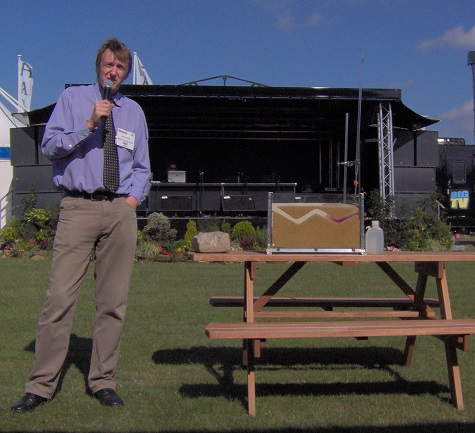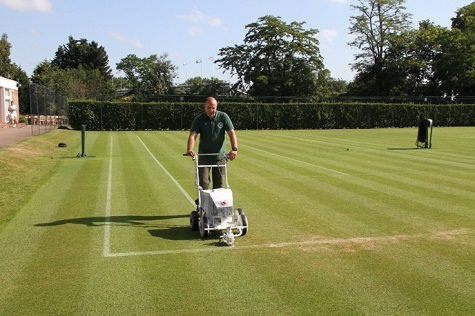TurfPro's Guest editor this month, Alex Vickers, is a popular and well-respected turf consultant within the UK’s turf industry and currently works as a consultant within the GMA’s Turf Care Advisory scheme. He previously worked with turf consultancy TGMS before his recent four-year soil science consultancy role in Uganda.

Alex Vickers
Bernard Baruch once wrote that “Millions saw the apple fall, but Newton asked why”.
I hope you are, like Newton, curious. This guest editorial could be a little different to previous ones. I was going to write about education, but as I thought about it I decided that perhaps the more interesting subject would be how to cultivate an attitude that loves to learn, rather than the dull stuff around courses, education, grades, qualifications. Yes, they are all important, absolutely they are, but they have been covered so many times that, frankly, I get a bit bored of all that these days.
Carl Sagan once said that “every kid starts out as a natural scientist, until we beat it out of them”. I am not sure that is quite true, but I know too many people who have been told they are too stupid, too slow or too thick to get an education just because they could not access the education they were being given. As the father of a daughter with dyslexia and quite splendid ADHD, it is clear to see that our school system does not always do well in helping such people learn and understand.

In sports turf management I find many people just like my daughter, who struggled to access formal education or who had to work twice as hard just to stand still. It is difficult to remain curious when learning anything is a fight. It is easy to give up and believe that maybe you really are stupid, but in my many years of formal and informal teaching I have yet to find anyone who is unable to learn. But I have met people who no longer want to. Who have had curiosity beaten out of them by the passage of time and the trials of life and the prophesies of doom spoken over them by those who should know better. If you are someone like that, you have my sincere sympathy and my strong encouragement – don’t give up! Keep asking why? Keep curious and seek to find new ways to answer those questions that surface in your mind when you give them a chance.

Alex Vickers presenting
How can we stoke up our curiosity again? Well, I am no psychologist but something most of us have in our industry is time to think. We have a brilliant opportunity presented by audio books to broaden our minds whilst doing everyday tasks. A way to inform ourselves that never used to exist. We can listen to books, podcasts, editorials of all kinds, whilst we roll our squares, decompact our pitches and mow the grass. And it does not have to be technical information (though that will help us work smarter). It can be something that fires our imagination and causes us to think in new ways. My advice – mix it up. Listen to stuff you know you like and are interested in, but then challenge yourself with something new and different.
Take time to think. Really think. When you are outside, look at the soil and ask yourself “how did this stuff get here and what is it made of?” Then start to fill in the gaps. Come up with your own ideas and note them down then check out some books or websites, read some magazines like this one and see what you got right and what you missed out. Fill in the gaps. As you do, new questions will arise. Like how do grass plant roots interact with the soil pores to access nutrients? How do the nutrients get from the soil into the plant? Can I make that easier or more efficient through the things I do to the soil as I do my work? Note down your thoughts then go off and see if you can find out what you missed or got wrong (that is doing research by the way – you are now up and running).

You are now an active student, learning new stuff and feeding your curiosity. Challenging your beliefs and assumptions. Keep going. Note down your thoughts and any new questions and go again. Maybe try out one of those online course people have suggested before but you never had the time or the desire (or confidence) to do. Before you know it the world you work in, relax in, get annoyed in, have fun in will have changed before your eyes. You will see new patterns and colours, hear new melodies and cross new horizons. You may even do your work differently – getting better results as the new things you have learned are applied to your pitches. Who knows, you may even start doing your own experiments and learning things for yourself that you can then share with others. You may mess it up a few times but that is part of learning too. I am not saying it will be easy, it won’t be, but things that come freely have little value. You cannot over-feed your curiosity, only starve it.

Mark Twain once wrote that “Education was the path from cocky indifference to miserable uncertainty”. There is something in that. But uncertainty is no bad thing and need not be miserable. The best education is the education that happens without us knowing it. That sneaks up on us as we feed and stoke our curiosity. In my time in academia, I saw many students flourish and thrive once they realised that learning was simply staying curious, asking questions and reflecting on what they had done and found out. This is something we can all do, no matter our age, our learning background or what others have said about us. Let’s face it, there are only so many funny animal TikToks any sane person can watch, so why not try something different and exercise that amazing thing hidden inside your skull? You will be astounded at what it can do and where it can take you.
I hope you made it this far. Stay curious.